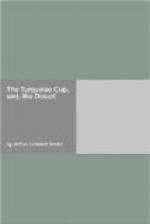The cardinal drew a breath so sharp that it was almost a sob, then he took Lady Nora’s hand.
“My child,” he said, “I am an old man. I am threescore years and ten, and six more, and you bring back to me the happiest days of my youth. You are the image of Nora Blake, yes, her very image. I kiss the images of saints every day,” he added, “why not this one?” and he bent and kissed Lady Nora’s hand.
There was so much solemnity in the act that an awkward pause might have followed it had not Miss O’Kelly been Irish.
“Your imminence,” she said, “since you’ve told us your age, I’ll tell you mine. I’m two-and-twenty and I’m mighty tired of standin’. Let’s go aft and have our tay.”
They had taken but a few steps when Lady Nora, noticing the cardinal’s limp, drew his arm through her own and supported him.
“I know the whole story,” she whispered. “You loved my grandmother.”
“Yes,” said the cardinal, “but I was unworthy.”
IV
They had their tea, two white-clad stewards serving them. The cardinal took a second cup and then rose and went to the side. He crumbled a biscuit along the rail.
“I have often wondered,” he said, “if my pigeons come for me or for my crumbs. Nora Blake used to say that her poor were as glad to see her without a basket as with one. But she was a saint. She saw things more clearly than it is given to us to see them.”
The women looked at each other, in silence.
“No,” said the cardinal, after an interval, “they do not come; they are as satisfied with Pietro’s crumbs as with mine. Love is not a matter of the stomach;” and he brushed the crumbs overboard. “Perhaps the fishes will get them,” he added, “and they will not know whence they came. Anonymous charity,” he continued, coming back to his chair, “is the best. It curbs the pride of the giver and preserves the pride of the recipient. Open giving is becoming a trade. It is an American invention. Very rich men in that country offer so much for an object—a college—a hospital—a library—if some one else will give so much. The offer is printed in the newspapers of the land and its originator reaps much—what is the word I wish?—acclaim? no; kudos? no;—ah, yes, advertisement; that is the word. Thank God that charity does not thus masquerade in Italy. There are men here, in poor old Venice, who give half their goods to feed the poor. Are their names published? No. The newspapers reason thus—’Here is a gentleman; let us treat him as one,’ We have no professional philanthropists in Italy. After all,” he added, “mere giving is the lowest form of charity. If all the wealth of the world were divided the world would be debauched. Binding up wounds, pouring in oil and wine, bringing the wronged man to an inn, giving him your companionship, your sympathy, so that he shows his heart to you and lets you heal its bruises—that is your true charity.”




